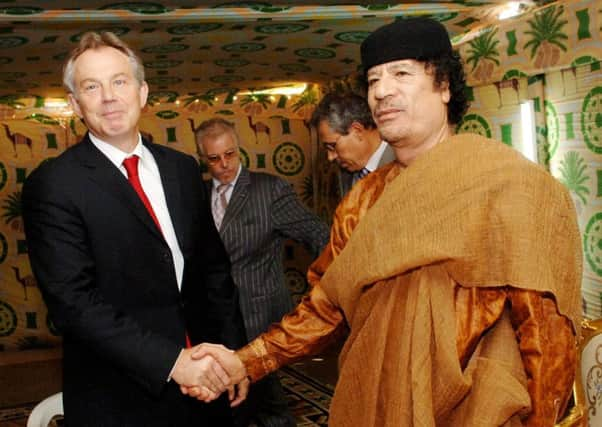Tony Blair: Engaging Libya ‘could have stopped IS’


Mr Blair met former Libyan leader Muammar Gaddafi in his desert tent in 2004, as the north African country began its return to the international community after years of isolation for supporting terrorism.
As part of the process, Gaddafi renounced weapons of mass destruction, bringing to a halt programmes to develop nuclear and chemical arms.
Advertisement
Hide AdAdvertisement
Hide AdGiving evidence to the House of Commons foreign affairs committee, Mr Blair said he believed his decision to engage with Libya remained “important” in the present day, after IS – also known as Isil, Isis or Daesh – established a presence in the country in the chaotic circumstances which followed Gaddafi’s removal and death in the 2011 revolution.
“Otherwise, we would have had a situation where Libya was continuing to sponsor terrorism, was continuing to develop chemical and nuclear weapons and would have remained isolated in the international community,” said the former PM.
“I think it is important that we brought them in from the cold, as it were, and important also in today’s context because I think - particularly if we had still had the residue of that chemical weapons programme in Libya today, given the state of Libya today and given the presence of Isis there – it would have constituted a real risk, even today.”
Committee chairman Crispin Blunt told Mr Blair that he regarded the reopening of Libya, with its vast oil resources, as “a signal achievement of your premiership”.
Mr Blair said he hoped Mr Blunt was right, adding: “It was always one of those decisions that was difficult because of the nature of the regime and the individual we were dealing with.
“But on the other hand, I think it was worthwhile, because of the protection of our security and because of the broader interest of trying to engage a country like that in a process of change.”
The former PM confirmed he continued to make visits to Libya after leaving office in 2007, saying he felt it was “important to see if it was possible to get them to do the political and economic reform that followed their switch from the position on security”. He added: “I’m not sure it was very easy to do that, but it was worth trying in my view.”
Mr Blair said he had “never had any business interests in Libya”.
Advertisement
Hide AdAdvertisement
Hide AdFollowing his departure from office, “the interaction I had with them was really as a result of the interaction I had with them in government,” he said.
Mr Blair said he would talk with Gaddafi about the Palestinian issue and Africa as well as the prospects for Libya to open up its economy and make political change.
“The tragedy of Libya is that the potential of the country is enormous,” said the former PM. “It’s got some incredible assets. It’s potential in energy is huge, and so it is in tourism.”